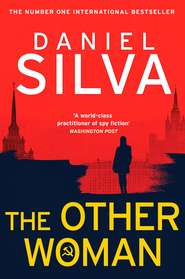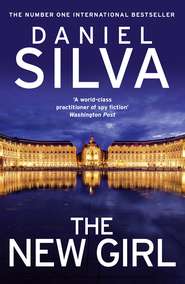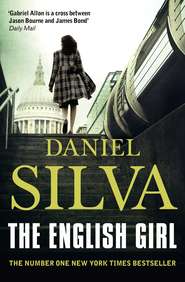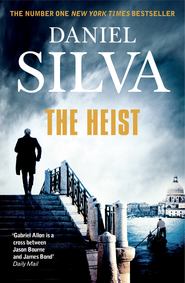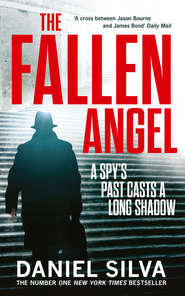По всем вопросам обращайтесь на: info@litportal.ru
(©) 2003-2024.
✖
The English Spy
Автор
Год написания книги
2018
Настройки чтения
Размер шрифта
Высота строк
Поля
“I’d take it if I were you. The old woman implied it could get nasty.”
“How nasty?”
Keller made no reply. Gabriel accepted the talisman and hung it around his neck. One by one the lights of the island went dark. And then it was gone.
12 (#ulink_90a874e7-363b-53a5-bb6f-3ac150d1720b)
DUBLIN (#ulink_90a874e7-363b-53a5-bb6f-3ac150d1720b)
TECHNICALLY, THE OPERATION UPON WHICH Gabriel and Christopher Keller embarked the following day was a joint undertaking between the Office and MI6. The British role was so black, however, that only Graham Seymour knew of it. Therefore, it was the Office that saw to the travel arrangements, and the Office that rented the Škoda sedan that was waiting in the long-term parking lot at Dublin Airport. Gabriel searched the undercarriage before climbing behind the wheel. Keller slid into the passenger seat and, frowning, closed the door.
“Couldn’t they have got something better than a Škoda?”
“It’s one of Ireland’s most popular cars, which means it won’t stand out.”
“What about guns?”
“Open the glove box.”
Keller did. Inside was a Beretta 9mm, fully loaded, along with a spare magazine and a suppressor.
“Only one?”
“We’re not going to war, Christopher.”
“That’s what you think.”
Keller closed the glove box, Gabriel inserted the key into the ignition. The engine hesitated, coughed, and then finally turned over.
“Still think they should have rented a Škoda?” asked Keller.
Gabriel slipped the car into gear. “Where do we start?”
“Ballyfermot.”
“Bally where?”
Keller pointed to the exit sign and said, “Bally that way.”
The Republic of Ireland was once a land with almost no violent crime. Until the late 1960s Ireland’s national police force, the Garda Síochána, numbered just seven thousand officers, and in Dublin there were only seven squad cars. Most crime was of the petty variety: burglaries, pickpocketing, the occasional strong-armed robbery. And when there was violence involved, it was usually fueled by passion, alcohol, or a combination of the two.
That changed with the outbreak of the Troubles across the border in Northern Ireland. Desperate for money and arms to fight the British Army, the Provisional IRA began robbing banks in the south. The low-level thieves from the impoverished slums and housing estates of Dublin learned from the Provos’ tactics and began carrying out daring armed heists of their own. The Gardaí, understaffed and outmatched, were quickly overwhelmed by the twin threat of the IRA and the local crime lords. By 1970 Ireland was tranquil no more. It was a gangland where criminals and revolutionaries operated with impunity.
In 1979 two unlikely events far from Ireland’s shores sped the country’s descent into lawlessness and social chaos. The first was the Iranian revolution. The second was the Soviet invasion of Afghanistan. Both resulted in a flood of cheap heroin onto the streets of Western European cities. The drug poured into the slums of south Dublin in 1980. A year later it ravaged the ghettos of the north side. Lives were broken, families were shattered, and crime rates soared as desperate addicts tried to feed their habits. Entire communities became dystopian wastelands where junkies shot up openly in the streets and dealers were kings.
The economic miracle of the 1990s transformed Ireland from one of Europe’s poorest countries into one of its richest, but with prosperity came an even greater appetite for narcotics, especially cocaine and Ecstasy. The old crime bosses gave way to a new breed of kingpins who waged bloody wars over turf and market share. Where once Irish mobsters used sawed-off shotguns to enforce their will, the new gangland warriors armed themselves with AK-47s and other heavy weaponry. Bullet-riddled bodies began to appear on the streets of the housing estates. According to a Garda estimate in 2012, twenty-five violent drug gangs now plied their deadly trade in Ireland. Several had established lucrative ties to foreign organized crime groups, including remnants of the Real IRA.
“I thought they were against drugs,” said Gabriel.
“That might be true up there,” said Keller, pointing toward the north, “but down here in the Republic it’s a different story. For all intents and purposes, the Real IRA is just another drug gang. Sometimes they deal drugs directly. Sometimes they run protection rackets. Mainly, they extort money from the dealers.”
“What does Liam Walsh do?”
“A little of everything.”
Rain blurred the headlamps of the evening rush hour traffic. It was lighter than Gabriel had expected. He supposed it was the economy. Ireland’s had fallen farther and faster than most. Even the drug dealers were hurting.
“Walsh has republicanism in his veins,” Keller was saying. “His father was IRA, and so were his uncles and brothers. He went with the Real IRA after the great schism, and when the war effectively ended he came down to Dublin to make his fortune in the drug business.”
“What’s his connection to Quinn?”
“Omagh.” Keller pointed to the right and said, “There’s your turn.”
Gabriel guided the car into Kennelsfort Road. It was lined on both sides by terraces of small two-story houses. Not quite the Irish miracle, but not a slum, either.
“Is this Ballyfermot?”
“Palmerstown.”
“Which way?”
With a wave of his hand, Keller instructed Gabriel to continue straight. They skirted an industrial park of low gray warehouses, and suddenly they were on Ballyfermot Road. After a moment they came upon a parade of sad little shops: a discount department store, a discount linen store, a discount optician, a chip shop. Across the street was a Tesco supermarket, and next to the supermarket was a betting parlor. Sheltering in the entrance were four men in black leather coats. Liam Walsh was the smallest of the lot. He was smoking a cigarette; they were all smoking cigarettes. Gabriel turned into the Tesco car park and eased into an empty space. It had a clear view of the betting parlor.
“Maybe you should leave the engine running,” said Keller.
“Why?”
“It might not start again.”
Gabriel killed the engine and doused the headlamps. Rain beat heavily against the windscreen. After a few seconds Liam Walsh vanished in a blurry kaleidoscope of light. Then Gabriel flicked the wipers and Walsh reappeared. A long black Mercedes sedan had pulled up outside the betting parlor. It was the only Mercedes on the street, probably the only one in the neighborhood. Walsh was talking to the driver through the open window.
“He looks like a real pillar of the community,” said Gabriel quietly.
“That’s how he likes to portray himself.”
“So why is he standing outside a betting parlor?”
“He wants the other gangs to know that he’s watching his turf. A rival tried to kill him on that very spot last year. If you look closely, you can see the bullet holes in the wall.”
The Mercedes moved off. Liam Walsh returned to the shelter of the entrance.
“Who are those nice-looking fellows with him?”
“The two on the left are his bodyguards. The other one is his second-in-command.”
“Real IRA?”
“To the core.”






